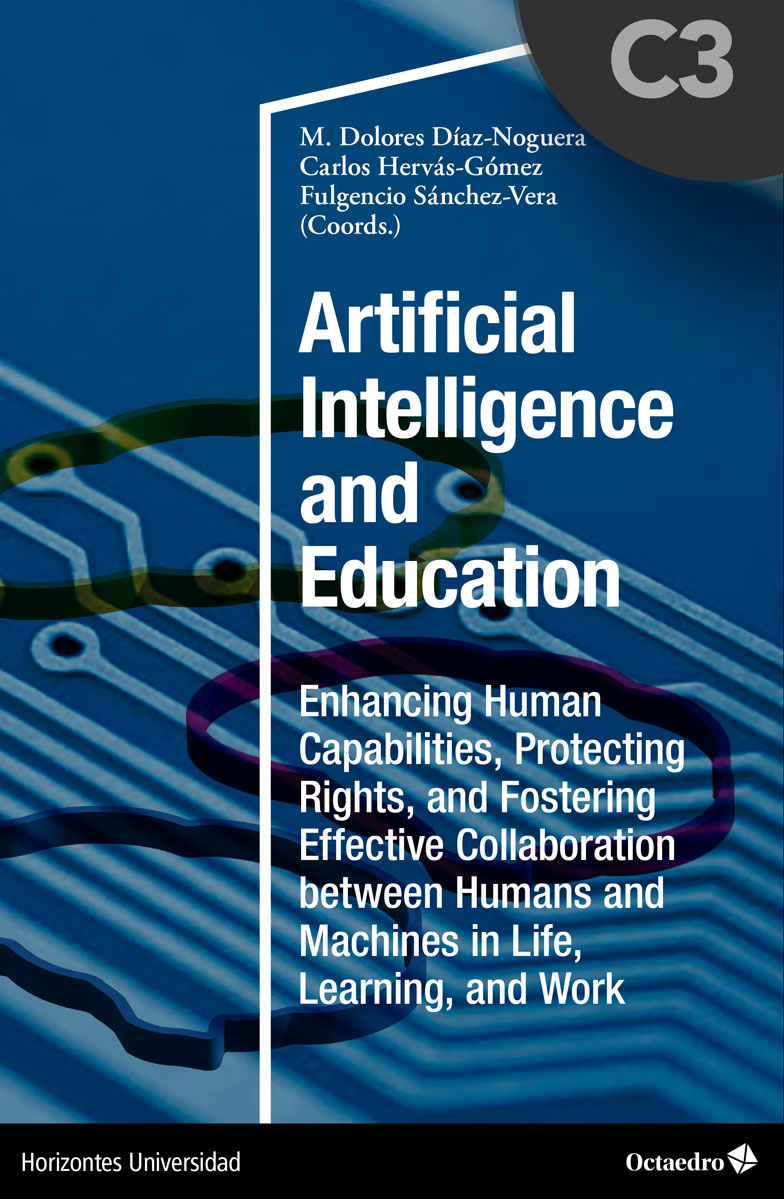FICHA TÉCNICA
Fecha de publicación:
06/11/2024
Doi del capítulo:
Título del libro: Artificial Intelligence and Education
URL del libro:
ISBN del libro: 9788410282452
DOI del libro:
Abstract
«The aim of this study was to analyze the validated psychometric characteristics of the ‘Scale of Attitudes towards the inclusion of Artificial Intelligence, called Pretest_Perception and Attitude towards Artificial Intelligence in the Educational Environment’ (EIPAA-IAE)’ using a short version for future teachers, in the integration of AI as a learning tool. The study describes future teachers’ attitudes towards critical thinking, emotional competencies and creativity, determining the internal consistency and reliability of the designed tool. The design structure of the instrument consists of the following three latent factors, which were obtained through an exploratory factor analysis (EFA): AI/critical thinking, AI/emotional competencies, and AI/creativity. The questionnaire was applied to a sample of 205 participants. With confirmatory factor analyses (CFA), a prior hypothesis was established regarding the relationship of the factors and their number and nature, specifying the number of factors and the way in which the variables relate to each other. According to the analyses, 66.53% of the total variance was explained. Reliability, calculated with Cronbach’s alpha, reached an overall value greater than 0.90 (α = 0.94). This valid and reliable questionnaire, which incorporates a dimension that measures the transfer of learning in hybrid and multimodal models of digital ecosystems in higher education with AI, can be applied in the evaluation of online education processes.»
Palabras clave
Autores
PhD María Dolores Díaz-Noguera
Universidad de Sevilla, Spain
noguera@us.es
https://orcid.org/0000-0002-0624-4079
PhD Carlos Hervás-Gómez
Universidad de Sevilla, Spain
hervas@us.es
https://orcid.org/0000-0002-0904-9041
Eduardo Puraivan
Universidad de Viña del Mar, Chile
Universidad de Playa Ancha, Chile
epuraivan@uvm.cl
https://orcid.org/0000-0003-2134-8922
Mg. Macarena Gema Astudillo-Vásquez
Universidad de Viña el Mar, Chile
mastudillo@uvm.cl
https://orcid.org/0000-0001-5840-0865
Mg. Connie Cofré-Morales
Universidad de Viña del Mar, Chile
connie.cofre@docente.uvm.cl
https://orcid.org/0009-0000-1442-1218
Cómo citar
Díaz-Noguera, M. D., Hervás-Gómez, C., Puraivan, E., Astudillo-Vásquez, M. G., Cofré-Morales, C. (2024). Validation of the Attitude Scale on the Perceptions of Future Teachers about Artificial Intelligence and its Consequences on their Motivation, Critical Thinking and Improvement of their Learning. In Díaz-Noguera, M. D., Hervás-Gómez, C., Sánchez-Vera, F. (Coords.), Artificial Intelligence and Education (pp. 51-64). Octaedro. https://doi.org/10.36006/09643-1-03
Referencias bibliográficas
«Bai, J.Y.H., Zawacki -Richter, O., & Müskens , W. (2022). Developing strategic scenarios for artificial intelligence applications in higher education. In 5th International Open and Distance Learning Conference Proceedings Book (pp. 47-70). Eskişehir, Turkey. https://iodl.anadolu.edu.tr/proceedings-iodl-2022
Bai, J. Y. H., Zawacki -Richter, O., & Müskens, W. (in press). Re-examining the future prospects of artificial intelligence in education (AIEd) in light of the GDPR and ChatGPT . Turkish Online Journal of Distance Education
Boulay, J. (2016). Artificial Intelligence as an effective classroom assistant. IEEE Intelligent Systems, 31, 76-81. https://doi.org/10.1109/mis.2016.93
Castillejos López, B. (2022). Artificial Intelligence and personal learning environments: Attentive to the appropriate use of technological resources by university students. Education, 31(60), 9-24.
Chaturvedi, I., Cambria, E., & Welsch, R. (2023). Teaching simulations supported by Artificial Intelligence in the real world. Education Sciences. https://doi.org/10.3390/educsci13020187
Chen, L., Chen, P., & Lin, Z. (2020). Artificial Intelligence in education: A review . IEEE Access, 8, 75264-75278. https://doi.org/10.1109/ACCESS.2020.2988510
Dellepiane, P., & Guidi , P. (2023). Artificial Intelligence and education: Challenges and opportunities from an ethical perspective. Question /Cuestión, 3(76), e859-e859.
Google. (2022). Google Cloud. https://cloud.google.com/natural
IEEE (2019). Ethically aligned design: A vision for prioritizing human well-being with autonomous and intelligent systems. In The IEEE Global Initiative on Ethics of Autonomous and Intelligent Systems. https://standards.ieee.org/content/ieeestandards/en/industry-connections/ec/autonomous-systems.html
Kasneci, E., Sessler, K., Kuchemann, S., Bannert, M., Dementieva, D., Fishcher, F., … & Kasneci, G. (2023). ChatGPT for Good? On opportunities and challenges of large language models for education. edArXiv preprint. https://doi.org/10.35542/osf.io/5er8f
Meléndez, N., Briceño, M., Gibertoni , J., & Lucente , R. (2023). Text mining applied to sentiment analysis to search for motivation patterns in teacher updating programs. CIE Academic Journal, 2(1), 32-40.
OECD (2022). Recommendation of the Council on Artificial Intelligence. OECD/LEGAL/0449. https://legalinstruments.oecd.org/en/instruments/OECD-LEGAL-0449
Oviedo Guevara, L. G. (2023). Dilemma of Artificial Intelligence: critical thinking and digital generations. Reality and Reflection, 58, 69-83.
Qi, B. (2019). Analysis on the application of Artificial Intelligence in classroom. Journal of Physics: Conference Series, 1345. https://doi.org/10.1088/1742-6596/1345/4/042075
Tuomi, I. (2018). The impact of Artificial Intelligence on learning, teaching, and education. European Commission, Joint Research Centre. https://doi.org/10.2760/12297
UNESCO (2021). Recommendation on the ethics of Artificial Intelligence. United Nations Educational, Scientific and Cultural Organization. https://unesdoc.unesco.org/ark:/48223/pf0000381137
Zawacki -Richter, O., Marín, V. I., Bond, M., & Gouverneur, F. (2019). Systematic review of research on Artificial Intelligence applications in higher education. Where are the educators? International Journal of Educational Technology in Higher Education Education, 16, 1-27. https://doi.org/10.1186/s41239-019-0171-0
Zhang, Y. (2022). Development and application of Artificial Intelligence multimedia technology based on Big Data. Mob. Info. Syst., 2073091. https://doi.org/10.1155/2022/207309»
